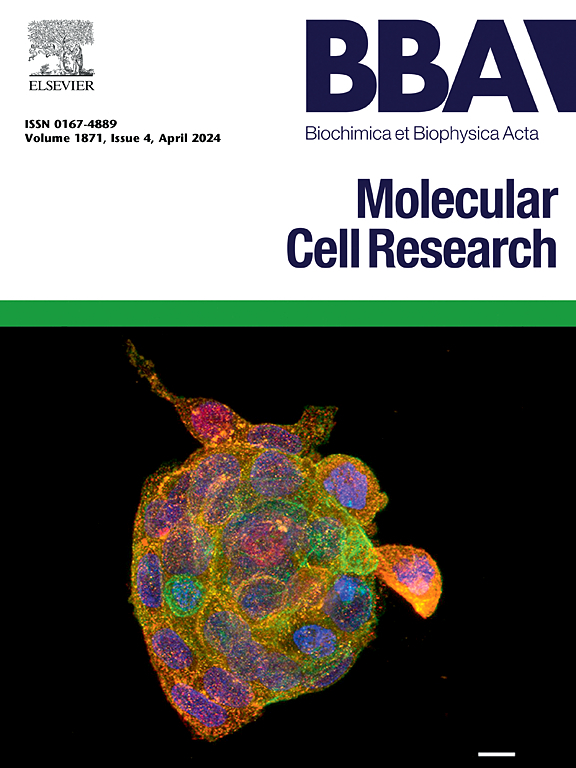黄芩素通过fto依赖的m6A去甲基化ZEB1,破坏TGF-β诱导的胰腺癌EMT
IF 4.6
2区 生物学
Q1 BIOCHEMISTRY & MOLECULAR BIOLOGY
Biochimica et biophysica acta. Molecular cell research
Pub Date : 2025-04-20
DOI:10.1016/j.bbamcr.2025.119969
引用次数: 0
摘要
胰腺导管腺癌(PDAC)是一种高度侵袭性的恶性肿瘤,预后差。黄芩素是一种从黄芩根部提取的类黄酮,传统上用于中药,已被证明具有抑制癌症发生和发展的潜力。然而,其作用机制仍然知之甚少,特别是通过m6A RNA甲基化对表观遗传基因进行调控。本研究采用3株人PDAC细胞系和1株非恶性细胞系。采用RT-qPCR、MeRIP-qPCR、Western blotting、球体形成、RNA稳定性和MTT等多种检测方法检测黄芩素的作用,以评估细胞功能和m6A调控。黄芩素显著降低细胞活力、迁移、侵袭和菌落形成。它还下调了FTO,一种对m6A RNA去甲基化至关重要的酶。FTO的敲低复制了黄芩素的作用,强调了其在PDAC中的致癌作用。生物信息学分析发现zeb1 -上皮细胞向间质细胞转化的关键转录因子-是FTO调节的m6a修饰靶标。黄芩素处理和FTO敲除均增强了m6A修饰,降低了ZEB1 mRNA的稳定性,从而抑制了干细胞相关特征。救援实验进一步证实黄芩素破坏TGF-β/FTO/ZEB1信号轴,突出其在PDAC中的治疗潜力。该研究为开发针对PDAC的新型治疗策略提供了基础见解。本文章由计算机程序翻译,如有差异,请以英文原文为准。

Baicalein disrupts TGF-β-induced EMT in pancreatic cancer by FTO-dependent m6A demethylation of ZEB1
Pancreatic ductal adenocarcinoma (PDAC) is a highly aggressive malignancy associated with poor prognosis. Baicalein, a flavonoid extracted from the roots of Scutellaria baicalensis, traditionally used in Chinese medicine, has demonstrated potential in inhibiting cancer development and progression. However, its mechanism of action remains poorly understood, particularly regarding epigenetic gene regulation through m6A RNA methylation. In this study, three human PDAC cell lines and one nonmalignant cell line were employed. The effects of baicalein were examined using multiple assays, including RT-qPCR, MeRIP-qPCR, Western blotting, spheroid formation, RNA stability, and MTT, to evaluate cellular functions and m6A regulation. Baicalein significantly reduced cell viability, migration, invasion, and colony formation. It also downregulated FTO, an enzyme critical for m6A RNA demethylation. Knockdown of FTO replicated the effects of baicalein, underscoring its oncogenic role in PDAC. Bioinformatic analysis identified ZEB1—a key transcription factor in epithelial-to-mesenchymal transition—as an m6A-modified target regulated by FTO. Both baicalein treatment and FTO knockdown enhanced m6A modification and decreased ZEB1 mRNA stability, thereby suppressing stemness-related features. Rescue experiments further confirmed that baicalein disrupts the TGF-β/FTO/ZEB1 signaling axis, highlighting its therapeutic potential in PDAC. This study offers fundamental insights for the development of novel therapeutic strategies targeting PDAC.
求助全文
通过发布文献求助,成功后即可免费获取论文全文。
去求助
来源期刊
CiteScore
10.00
自引率
2.00%
发文量
151
审稿时长
44 days
期刊介绍:
BBA Molecular Cell Research focuses on understanding the mechanisms of cellular processes at the molecular level. These include aspects of cellular signaling, signal transduction, cell cycle, apoptosis, intracellular trafficking, secretory and endocytic pathways, biogenesis of cell organelles, cytoskeletal structures, cellular interactions, cell/tissue differentiation and cellular enzymology. Also included are studies at the interface between Cell Biology and Biophysics which apply for example novel imaging methods for characterizing cellular processes.

 求助内容:
求助内容: 应助结果提醒方式:
应助结果提醒方式:


